- Home
- Kay Hooper
Velvet Lightning Page 11
Velvet Lightning Read online
Page 11
It sounded so simple. Reasonable. She was a reasonable, intelligent woman, after all. She wasn’t a schoolgirl languishing in heartbreak for what she couldn't have. She was a mature woman of twenty- eight who had lived long enough to know that hearts didn’t break, that they only ached as if they could and would, and that there were certain things she would never be able to call her own.
Captain Marc Tyrone was one of them.
And Catherine’s reasonable, rational, intelligent decision to end things between them cost her more pain than she would have believed possible. She had caught herself looking at her reflection in a mirror on Thursday afternoon, wondering why the pain didn't show. It should show plainly, she thought; nothing that hurt so badly could avoid leaving marks—claw marks—in the flesh.
But she looked the same as always—calm, remote, cold. It was with a different kind of pain that she wondered then if this “public” mask, discarded in relief in Tyrone’s presence, would gradually become her real self. With no Tyrone to evoke passion and laughter, how could she avoid it? Would she wake one morning and feel no conscious forming of the mask because the mask had become a normal part of her? Would the violence of her secret feelings simply churn wildly for a while before slowing, and finally dying, smothered to death inside her?
Oh, dear God . . .
“Did you say something, Catherine?”
She looked at her father across the table as they ate lunch on Friday. “No. No, Father, I didn’t say anything.”
“I thought you did.”
“No.”
Catherine glanced back down at her plate, wondering if the anguish inside her had escaped in some thread of sound. Dangerous. Her loss of control was dangerous. And it was so important, especially now, to maintain control. No one could be allowed to guess what she felt, not the town, not her father— and not Tyrone, especially not Tyrone.
He wouldn’t want it to end. She knew that, without vanity. She had, somehow, made an impression on Marc Tyrone’s life—or perhaps she had simply become a habit with him. In any case, he saw her as being a part of his life, so much so that he had flatly told her he would propose marriage a second time. When he heard her say his name.
Marc. It was in her head, always, a whisper away from her lips. She had managed, somehow, not to give in when he had tried, in passion, to force it from her. He knew then, had guessed, that she withheld that because it was her single defense against a total and complete intimacy. By using his surname, whether briskly or in passion, she held him firmly at a distance. With her mask and her morals stripped away by him, it was all she had left.
“I’m riding over to Gerald’s after lunch, Catherine,” her father said absently. “There’s a book he’s promised to lend me.”
“All right, Father.”
“What have you planned for this afternoon?”
She wondered briefly what his reaction would be if she told him the truth. I'm going to cut my heart out, Father. But she didn’t, of course. She said, “A walk perhaps.”
“It would do you good, no doubt. You’re looking quite peaked, Catherine.”
If her father saw that, what would Tyrone’s sharper gaze see? She couldn’t allow herself to appear at all uncertain or distressed by what she was about to do; if Tyrone found the chinks in her armor, she would never be able to hide the truth from him. She would have to appear calm and certain, and she couldn't be pale or shaky.
I won't shake. I won't. And I'll rouge my cheeks so that he won't notice a pallor. That’s it. I’ll paint my face like a whore when I go to him this last time.
The decision made, Catherine resolutely began wrapping layers of cold calm about herself. As she had never been forced to before, she called on all her willpower to hold her features expressionless, her eyes steady and cool, her body stiff. It was so vital now. She reminded herself over and over that it was desperately important not to betray her feelings—and not to allow her body to respond to his.
That would be hardest. The mask she could cling to, even with him, but her body . . .
Catherine felt heat, felt a slow throbbing begin deep inside her, and bent her head over her plate so that her father wouldn’t see. It's worse! she thought wildly. Worse, this longing of her body for his, worse because she knew she would never have him again. And her body refused to be willed into submission by her despairing mind, refused to feel cold and uncaring. Refused to stop wanting him.
From the first he had been able to instantly arouse her with no more than his presence, a veiled look, a slow smile; how in God’s name could she convince him that response no longer existed?
She had to. Somehow, she had to.
“Is there anything you need from town, Catherine?” her father asked casually a short time later.
‘‘No, Father. Will you be long?”
“Two or three hours, I suppose. You should take that walk, you know. Get some color in your cheeks.”
“Yes, I will.”
“All right, then.” He left, whistling cheerfully. A few minutes later she heard his old hack trotting from the stables and past the house. She waited a few more minutes, then went slowly up to her bedroom.
The pot of rouge, caked and dry, was in the drawer of her bureau; she had used it only rarely in England for masquerades and the like, but never here on the island. There had never been a reason to use it. Now there was. With a steady hand Catherine very lightly and carefully colored her pale cheeks. She studied her reflection, half nodded to herself. She looked, she decided, normal enough.
The dress she was wearing was dark blue and without frills; it could have been a gown of mourning. Was a gown of mourning.
Catherine went downstairs and then slipped from the house. She made her way through the garden and out to the road. She was careful to wait, to look and listen. When she was sure there was no one about to see her, she crossed the road and allowed the forest swallow her. Dim, cool. She walked steadily, reminding herself with every step that this was her only choice.
Only choice . . . only choice ... It echoed in her mind, a litany. Only choice. Only. Choice.
Who would she have to talk to after this?
Only choice. Only choice.
Never again to feel his passion . . .
Only choice. Only choice.
Never again to feel her own . . .
Only choice.
Never to say his name out loud . . .
She walked steadily to the cottage, went inside. She took down the blue curtains, folded them neatly, and put them on the floor in the main room. The fresh sheets they had not yet used were removed from the bed, folded, and placed on top of the curtains. The colorful quilt was added to the pile. Her hairbrush was placed on top.
She stood looking at the pathetic little stack. Not much, she thought wearily, to mark the end of passion, the end of joy. The end of happiness. She went into the bedroom and sat down on the edge of the bare mattress. She folded her hands in her lap and stared at the wall.
Gazing at a patch of mildew, she realized how odd it was that she had never felt sordid in this decaying, abandoned little cottage. Never. Though knowing the town would have branded her a whore for what went on here, she had never known the least bit of shame in this place. Suddenly it occurred to her why that was so: because she had loved him from the first. Anyplace with him would have been a place of joy and passion, a place where laughter would have come easily. Anyplace.
She heard hoofbeats, vaguely wondered why he was riding today instead of driving the buggy. She looked down at her hands and laced her fingers together. She heard the door open, a pause, heard it close. He had seen the curtains, the quilt, the sheets, her hairbrush. He would know what it meant.
Footsteps came slowly across the main room, stopped in the doorway. She braced herself inwardly and turned her head to look at him.
Tyrone leaned against the doorjamb, hands in his pockets. His face was set, grim. His eyes reminded Catherine of a stormy gray sky just before the Atlanti
c loosed one of its violent tempests. He didn't move, didn’t say a word. He simply stared at her and waited.
“It’s over,” she said.
The room was very silent for a few moments. Tyrone never changed expression; his voice was level, steady. “I see. And I have nothing to say about the matter, Catherine?”
Suddenly she couldn’t look at him. She couldn’t continue to meet those oddly flat, violent eyes. And even now, even sensing his anger, she also felt the painful longing of her body for him. The slow, steady, pulsing awareness of him so near. Every beat of her heart hurt. She looked down at her hands, fought to keep her voice even. “There’s nothing to say, Tyrone. We both knew it was a temporary arrangement.”
“It may have begun that way,” he said. “But two years isn’t temporary.”
“It's over,” she repeated.
“Why?” The single word, abruptly harsh.
Catherine was silent.
“Is it because you’ve grown to hate the way I can make you feel? Is that it, Catherine? Because you want to be with me, because I’ve disrupted your neat, unfeeling existence?”
She endured that jab, but felt a rush of bitterness, and wished with a sudden wildness that it were true. She could barely breathe past the tightness of her throat, could hardly speak for the anguish of her own emotions. If only she didn’t feel, couldn’t feel! Tonelessly she said, “There’s no reason to do this. It’s over, Tyrone. Just let it end.”
He didn’t. In the same harsh voice he said, “It’s the one thing you can’t control, isn’t it, Catherine? I can make you want me with half the town watching, and you can’t stand that. So I’m to be put out of your life like a stray cat, like something too bothersome to be tolerated.”
“Please,” she murmured, feeling buffeted, caught in the storm of his eyes. How could he do that, she wondered. How could he, without moving, lash her with the violence of his voice and his eyes? She wanted to avoid meeting that turbulent gaze, afraid of giving herself away, yet she found herself casting stolen glances at him without meaning to, again and again.
“Please, what, Catherine? Please take my dismissal like a gent, tip my hat and say thank you, ma’am? Well, I can’t do that. I’m a gentleman the way you’re a lady—all and only on the surface.”
She winced, half closed her eyes. Why not, she asked herself tiredly. Why shouldn’t he think that? It was the truth, wasn’t it?
“I’m sorry,” he said roughly. “I didn't mean that.”
“Yes, you did,” she said. “And it’s true enough. Why should I cavil at it?”
“Catherine—”
“Why can’t you let it end? Just ... let it end.” She felt beaten, physically battered.
“No. I want the truth from you now. Why?”
Torn between lies and the truth, she fumbled for a reason he could accept. “It’s too much. I’m tired of the tension, tired of secrecy.”
“It doesn’t have to be secret,” he bit out tautly. “I asked you to marry me, Catherine.”
“I don’t want marriage,” she said. I can’t have it.
“Is it marriage you don’t want? Or is it me?”
“Don’t ask me that,” she whispered, holding on desperately to the last fragile tendrils of control. They were slipping from her grasp; she could feel herself breaking.
Tyrone laughed, a terrible sound. “So that’s part of it as well. I’m good enough for a lover, but I don't have the blue blood for a husband. Well, as you said, it’s true enough, and why should I cavil at it? I’m the mongrel offspring of an Irish parlormaid and a Greek sailor, and all that I have now I have fought for all my life.”
“Don’t.” She was aching inside, unbearably hurt that he could believe her so shallow. And she was surprised by the touch of bitter defiance in his voice, surprised that it mattered to him, that he was sensitive about his beginnings. How little she really knew about him. But it was better to hurt only his pride, she thought dimly. He would have a reason to hate her, and that would end this between them.
She didn’t want him to hate her.
“I never suspected you were like the other fine citizens of Port Elizabeth,” he went on inexorably in the same bitterly caustic voice. “But you are, aren’t you, Catherine? Civilized behavior is everything, ruling here like a god. Never mind the rot underneath. You’ll happily take a lowly ship’s captain for a secret lover, and then coolly throw him out when you’re done with him, like garbage.”
“Stop.” She heard the thin note in her voice, the quiver of strain. “Don’t do this.” She felt sick, dizzy, cold.
“Oh, pardon me. Pardon me for feeling, Miss Waltrip. It seems I’m lacking all the way around, doesn’t it?”
Catherine realized she was standing, knew she had to get out of there, get away from him before the cry of anguished protest in her throat could escape. But something did escape, a thread of sound like a lost thing, soft and dazed. She went blindly toward the door, intent on pushing past him.
“Catherine!” He caught her shoulders hard, held her with fingers that bit into her.
“Let me go,” she whispered, staring fixedly at his tie.
There was a moment of thick silence, and then he grasped her chin in one hand and roughly turned her face up. “Look at me,” he ordered.
Unable to resist, she did, trying to keep her eyes blank, her face still. He was pale, a muscle jerking erratically beside his hard mouth. And his eyes were a stormy gray hell, wildly glittering with savage emotion. She wondered how she had ever thought him a remote man, an unfeeling man. He felt a great deal, it seemed. Catherine tried desperately to hide her own agonized feelings, tried to hide from him the knowledge that her body was his, her heart, her soul.
Tyrone bent his head suddenly and fitted his mouth to hers. Catherine stiffened at the first touch, attempting to keep her body still, frozen. And if he had kissed her with anger, with demand, she might have been able to do it. But Tyrone didn’t kiss her that way at all.
His hard mouth was incredibly gentle, asking rather than demanding, seducing with sweetness. Almost pleading for her response. It wasn't passion, it was caring, and it broke more than her will. She felt her body sway toward his, felt her mouth open to the tender, seeking warmth of his. She was drowning, and he was a lifeline; she was dying, and he was life. Dying—
“No!” she gasped, jerking back away from him.
“You don’t hate me,” he said thickly.
“Let me—”
Tyrone was staring into her eyes, his own suddenly darkening with realization and remorse, with the certain knowledge that he had hurt her unforgivably. His hand reached up to touch her cheek, his thumb rubbing briefly; they both looked at the smudge of red that had been transferred from her flesh to his. “Dutch courage,” he murmured.
“No.”
“I was wrong,” he said in a slow, husky voice. “Everything I said was wrong. Catherine—”
She ran. Blindly, forgetting the things left forlornly in the middle of the floor, she fled the cottage . . . and him. She was vaguely aware of his horse shying nervously as she burst through the door; she heard a violent oath from Tyrone, but she didn’t stop. She ran through the woods and scarcely paused at the road before hurrying across and into her father's garden.
“Catherine!” He caught her wrist, there in the overgrown garden, swung her around to face him.
She felt sheer panic sweep over her, and a cry of alarm escaped wildly. “No!”
He didn't try to draw her into his arms, but refused to release her wrist. “Catherine, please, you have to let me apologize! The things I said were cruel. Wrong. I’m sorry. You hurt me, and I struck out without thinking—”
“You weren’t wrong!” End it, just end it now. She fought to lower her voice, terrified that someone might be coming along the road and hear them. “You were right, Tyrone, right about everything. I don’t want you anymore.” She made her voice hard and cold. “You were just . . . just a convenience, something I wante
d and took. But no longer. I’m through with you, do you understand? Finished, as you said, like garbage.” The last came out in a whisper, and she braced herself instinctively against a rage she had earned.
But, incredibly, Tyrone wasn’t angry. He didn’t flinch from what she said to him, didn’t lash out at her because of the pain she had tried to inflict. Instead, he looked at her steadily with eyes that were clear now, a tiny frown forming between his brows. “You’ve been frightened all along,” he said slowly. “And now you’re half out of your mind with fear. For God’s sake, Catherine, tell me what you're afraid of!”
She searched despairingly for something to tell him, anything but the truth. “I’m afraid everyone will find out about us,” she got out finally in a choked voice.
He impatiently dismissed her words. “That isn’t it.”
“Yes, it is.” She tried to shore up the truth with lies. “I’m treated badly enough now; if they found out— Go away, Tyrone! Let me go, and leave me alone.”
“I can’t. You're a large part of my life, Catherine, and I can’t simply walk away.”
“You have to. I won’t see you again. It’s over.” She jerked her wrist free and turned away from him. His quiet voice stopped her two steps later.
“Catherine?”
She paused, looking back at him over her shoulder.
“It's an island,” he said. “How far can you run?”
She felt a wave of cold fear, hoped it didn’t show on her face. Turning away again, she went on toward the house with a steady stride. He'll be gone soon. Even if he stays longer this time, he’ll be gone. He’d go back to that larger part of his life, that part of business and work. And if there hadn’t been a woman here for him before, there soon would be.
She wanted to be glad for his sake, but all she could feel was tearing pain.
“Kate . ..”

 A Deadly Web
A Deadly Web Raven on the Wing
Raven on the Wing Always a Thief
Always a Thief Star-Crossed Lovers
Star-Crossed Lovers Blood Dreams
Blood Dreams Shades of Gray
Shades of Gray Rebel Waltz
Rebel Waltz Chill of Fear
Chill of Fear Sleeping With Fear
Sleeping With Fear After Caroline
After Caroline Time After Time
Time After Time Haunting Rachel
Haunting Rachel Hunting Fear
Hunting Fear Out of the Shadows
Out of the Shadows Whisper of Evil
Whisper of Evil Blood Sins
Blood Sins Hiding in the Shadows
Hiding in the Shadows C.J.'s Fate C.J.'s Fate C.J.'s Fate
C.J.'s Fate C.J.'s Fate C.J.'s Fate Fear the Dark
Fear the Dark Illegal Possession
Illegal Possession Stealing Shadows
Stealing Shadows If There Be Dragons
If There Be Dragons Once a Thief
Once a Thief In Serena's Web
In Serena's Web On Wings of Magic on Wings of Magic
On Wings of Magic on Wings of Magic Hostage
Hostage The First Prophet
The First Prophet Through the Looking Glass
Through the Looking Glass Golden Flames
Golden Flames Finding Laura
Finding Laura Haven
Haven The Haviland Touch
The Haviland Touch The Lady and the Lion
The Lady and the Lion Haunted
Haunted Velvet Ligntning
Velvet Ligntning Blood Ties
Blood Ties Adelaide, the Enchantress
Adelaide, the Enchantress The Matchmaker
The Matchmaker Golden Threads
Golden Threads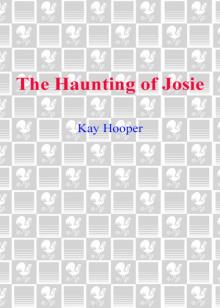 The Haunting of Josie
The Haunting of Josie Rafferty's Wife
Rafferty's Wife Amanda
Amanda Hold Back the Dark
Hold Back the Dark Sense of Evil
Sense of Evil What Dreams May Come
What Dreams May Come Larger Than Life
Larger Than Life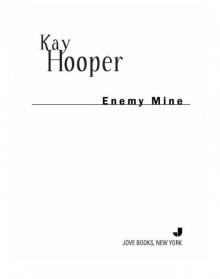 Enemy Mine
Enemy Mine Velvet Lightning
Velvet Lightning The Fall of Lucas Kendrick
The Fall of Lucas Kendrick Aces High
Aces High Captain's Paradise: A Novel
Captain's Paradise: A Novel The Wizard of Seattle
The Wizard of Seattle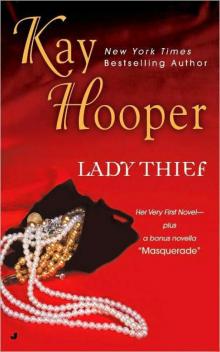 Lady Thief
Lady Thief Summer of the Unicorn
Summer of the Unicorn Outlaw Derek
Outlaw Derek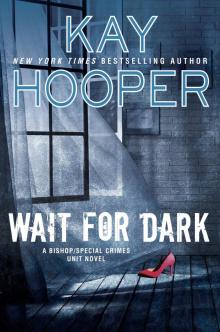 Wait for Dark
Wait for Dark The Glass Shoe
The Glass Shoe It Takes a Thief
It Takes a Thief Zach's Law
Zach's Law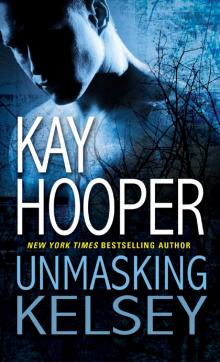 Unmasking Kelsey
Unmasking Kelsey Hidden Salem
Hidden Salem